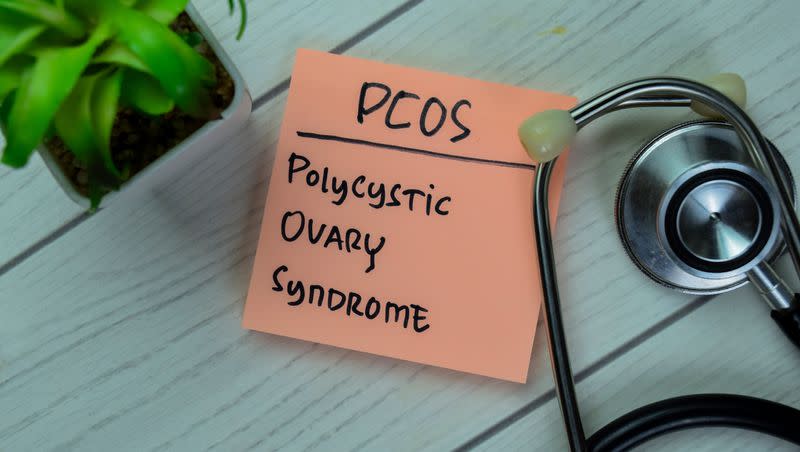PCOS suicide risk calls for mental health monitoring, treatment

As many as 1 in 8 women of child-bearing age in the U.S. have polycystic ovary syndrome, a condition linked to infertility, irregular periods, hair growth, acne and weight gain.
A new study in the Annals of Internal Medicine says those women are at higher risk of self-harm, including suicide, compared to those who don’t have the condition.
But the more-than-eightfold risk may not be because of the health burden. Instead, research suggests it may be related to societal expectations.
Commonly called PCOS (pronounced P-cose), the syndrome is also associated with a higher risk of psychiatric conditions including anxiety and depression, among others.
“At this time, the exact cause is unknown and it is likely multifactorial. The higher androgens may play a role. Many women with PCOS also have insulin resistance, which also can increase mental illness such as depression. Women with PCOS may have higher rates of obesity and infertility, which are also associated with depression/anxiety. The physical changes associated with PCOS may also increase depression/anxiety,” Dr. Sun Kim, an associate professor of endocrinology at Stanford Medicine, who was not involved in the study, told Medical News Today.
Experts emphasize that PCOS can be treated.
Endocrineonline.org notes that research shows women diagnosed with PCOS 30 years ago have a normal life expectancy. Additionally, when researchers looked at death certificates of women who had PCOS, they found “no excess risk” of cancer in any organ. Nor does risk of heart disease increase with the condition.
What is PCOS?
PCOS is a female reproductive health disorder characterized by a hormonal imbalance that may cause infertility, obesity and excessive facial hair. The U.S. Office on Women’s Health said that the imbalance creates problems in the ovaries, which can lead to irregular periods, which can in turn lead to infertility and development of ovarian cysts.
The article said most people first learn they have PCOS in their 20s and 30s when they have trouble getting pregnant. But it can happen any time after puberty. The risk may be higher if someone has obesity or if close female relatives — mother, sister or aunt — were diagnosed with PCOS.
Related
Besides previously mentioned symptoms, women with PCOS can also have thinning hair, weight gain or trouble losing weight, darkening skin along neck creases, in the groin and under the breasts, and skin tags in the armpits or neck area.
PCOS has been associated with a higher risk of unhealthy cholesterol levels, sleep apnea, depression and anxiety, and endometrial cancer.
Thyroid disease is sometimes mistaken for PCOS, the article said.
What the study found
Researchers at Taipei Veterans General Hospital in Taiwan used data from 18,960 individuals with PCOS, each one matched with 10 control subjects by age, psychiatric comorbid conditions, urbanization levels and income. They found an 8.47-fold increased risk of suicide attempts across adolescent, young adult and older adult groups.
“This suggests the importance of routine monitoring of mental health and suicide risk in persons diagnosed with PCOS,” they wrote.
According to Yahoo!Life, “It’s important to point out that this isn’t the first time PCOS has been linked with suicide. A nationwide Swedish study published in 2016 found that women with PCOS were 40% more likely to attempt suicide than other women, and a 2022 study found that a recent PCOS diagnosis was linked with a higher risk of suicidal thoughts.”
Per the new study from Taiwan, adolescents with PCOS had fivefold risk for attempted suicide compared to the control group. Those ages 20 to 40 had nine times the risk. And those older than 50 had the lowest risk, though it was still somewhat elevated compared to the control group at 3.75 times greater risk than those without PCOS.
Experts are struggling to explain the elevated risk, but offer theories. It could be that the hormone fluctuations associated with PCOS increase distress, some posit. Others theorize that associated conditions like Type 2 diabetes or high blood pressure, which can occur with PCOS, worsen depression.
Hillary Ammon, a clinical psychologist at the Center for Anxiety & Women’s Emotional Wellness, told Yahoo!Life that “many women report feeling dismissed or being misdiagnosed after sharing their symptoms with medical providers.”
Treatment for PCOS varies, but can include hormonal birth control, antiandrogen medicines and metformin, according to the U.S. Office on Women’s Health.
“Healthy eating habits and regular physical activity can help relieve PCOS-related symptoms. Losing weight may help to lower your blood glucose levels, improve the way your body uses insulin, and help your hormones reach normal levels. Even a 10% loss in body weight (for example, a 150-pound woman losing 15 pounds) can help make your menstrual cycle more regular and improve your chances of getting pregnant,” according to the article.

